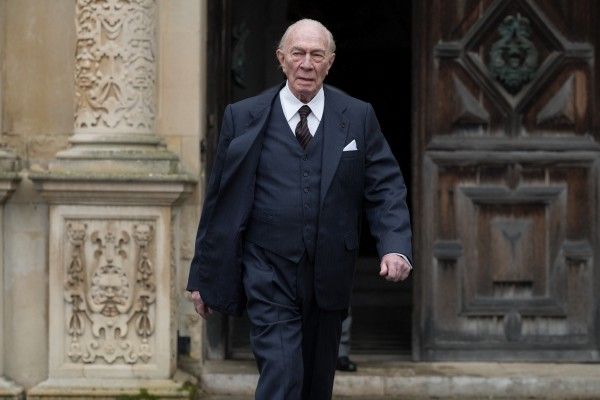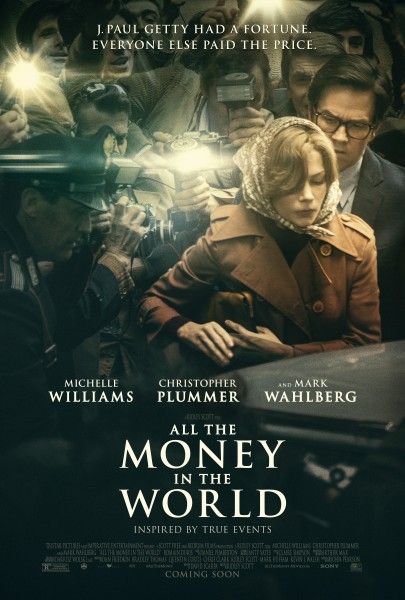For better and worse, All the Money in the World is the kind of professional, workmanlike product we’ve come to expect from director Ridley Scott. His desire to simply get the film made and move on to the next one leaves a trail of films that are largely unrefined in their storytelling, hinting at better ideas but compromised by time and circumstance so they largely don’t achieve their maximum impact. We saw that earlier this year with Alien: Covenant, a movie that’s doing some really interesting things with the androids, but gets bogged down in a rote monster movie and franchise fatigue. All the Money in the World is yet another “almost” movie from Scott, a picture that hints at interesting ideas but, for various reasons, can never completely cohere into something that leaves a lasting impact despite the timeliness and relevancy of the story.
In July 1973, John Paul Getty III, aka “Paul” (Charlie Plummer), was kidnapped by criminals in Rome, Italy and held for $17 million ransom, which the kidnappers believed his wealthy grandfather, oil baron J. Paul Getty (Christopher Plummer) would pay. Paul’s mother, Gail Harris (Michelle Williams), who was not wealthy, gets drawn into the web of intrigue between a grandfather who loves money more than anything and trying to save her son. She eventually becomes allied with Getty’s fixer, former CIA agent Fletcher Chase (Mark Wahlberg), who at first believes the kidnapping is a hoax but comes to realize that Paul is in real danger and his callous grandfather will do nothing to save the boy.
On the whole, there’s nothing particularly wrong with All the Money in the World. Scott is working with top-notch collaborators, and while the pacing is a bit of an issue at points, it’s not clear what should be cut or tightened since all of the plot points are important to the overall narrative. Additionally, there’s a solid theme lurking beneath the surface as Scott isn’t trying to create an indictment of the wealthy in as much as he’s returning to similar motifs (fallen empires like Gladiator, Alien: Covenant, and Exodus: Gods and Kings) combined with an exploration of how we determine value.
The notion of value and price are the most intriguing aspects of All the Money in the World. It’s content more suited to an economics lecture, and yet Scott has wrapped it in a crime thriller. Unfortunately, he never brings it to the surface in a consistent or satisfying manner. At best, we see how money warps and twists the value of things rather than something that can simply be exchanged for goods and services. When Chase goes to question a communist suspected of being involved in the kidnapping and remarks that he thought communists were above money, the communist replies, “No one is above money.” It’s a sentiment that’s held true throughout the picture and manifested in Getty.
Much has been made about the recasting of Getty from Kevin Spacey to Christopher Plummer following the allegations of sexual assault against Spacey, and Plummer is impressive in the role when you consider how little time he had to prepare and that he’s in a significant amount of the picture. And yet, I couldn’t shake the feeling that I had already seen Plummer give this performance, and in a way, I had. Last month, I saw him play Ebenezer Scrooge in The Man Who Invented Christmas, and there’s not much daylight between Scrooge and Getty except one is fictional and learns to be a better person because of ghosts. But they’re both tight-fisted misers who believe money is more important than people. Plummer’s good at playing the mean, rich guy, but the performance is more memorable for what happened off-screen than what’s happening in front of the camera.
The more memorable turn comes from Williams. While the trailers and ads have depicted her as “Concerned Mother”, Harris is really tough as nails and savvy operator. Williams imbues the character with a brassy, unrelenting drive while never ignoring the love she has for her son. While Harris is obviously terrified about what could happen to Paul, she never allows fear to get the better of her and she’s a force of nature even around powerful men like Getty and Chase. One of the disappointing things is that while the movie never hesitates to give Getty another monologue or scene emphasizing his worldview, Williams has to make the most of Harris’ screen time. The story never goes far enough in making Harris a central fixture, so we’re always wondering why she’s coming to crime scenes or following around Chase rather than just letting her declare, “I’m going where I want, when I want, and I won’t stop until I get my son back.” Instead, her presence feels like the script doesn’t want to lose sight of her, and yet never goes far enough in letting her just take center stage despite the strength of Williams’ performance.
The true story of the kidnapping of John Paul Getty III is fascinating and it deserves a solid adaptation since it has things to say about how wealth rules our world and twists our desires. Perhaps Danny Boyle’s upcoming miniseries Trust will do a better job of exploring the complexities and themes the story presents. For Scott, there’s no time to really give his film the consideration it deserves and to create something more permanent that speaks to the power of money. It’s on to the next project.
Rating: C+





